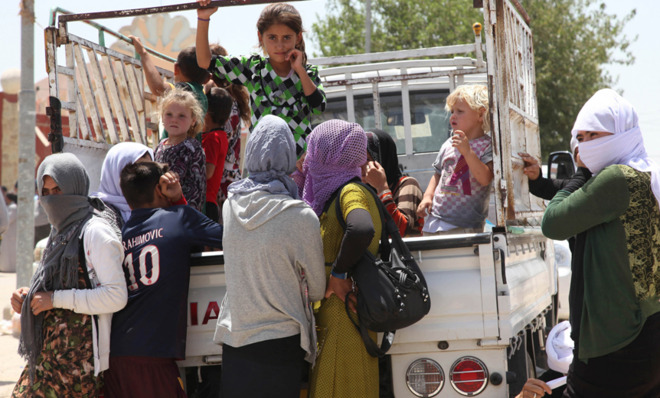Why it makes sense for Obama to authorize airstrikes in Iraq — but not Syria
The U.S. is gearing up for a military intervention in Iraq. That does not mean it should do the same in Syria.


A free daily email with the biggest news stories of the day – and the best features from TheWeek.com
You are now subscribed
Your newsletter sign-up was successful
Whenever President Obama makes a major foreign policy move, as he did last night announcing limited airstrikes in Iraq, it's inevitable that someone will ask, "Well, what about [X country that is also mired in conflict]?" The go-to example is Syria, where innocent civilians are being killed in the thousands in a full-blown civil war that the Obama administration has long kept at arm's length.
But the Iraq mission is special. As Obama made clear, this authorization of force has modest goals: 1) to protect U.S. personnel in the Kurdish city of Erbil and 2) to facilitate a humanitarian mission for 40,000 Yazidi Iraqis who are trapped without food or water and face imminent slaughter at the hands of the Islamic State in Iraq and Syria. There is no equivalent situation in Syria with such clear, executable goals.
Furthermore, the Iraqi government is a U.S. ally, as is the regional government in Kurdistan, where the latest action is happening. The U.S. has an interest in bolstering the regime and keeping it together; that is not the case in Syria. While Obama said he would prefer the Iraqi government to take the lead in this endeavor, the U.S.'s hand was forced after ISIS took advantage of gridlock in Baghdad to sow chaos in Kurdistan, which had once been an oasis of stability in Iraq.
The Week
Escape your echo chamber. Get the facts behind the news, plus analysis from multiple perspectives.

Sign up for The Week's Free Newsletters
From our morning news briefing to a weekly Good News Newsletter, get the best of The Week delivered directly to your inbox.
From our morning news briefing to a weekly Good News Newsletter, get the best of The Week delivered directly to your inbox.
Finally, the U.S. is partly to blame for the situation in Iraq. This is what happens when you recklessly invade other countries.
Could these airstrikes be the beginning of a slippery slope, drawing the U.S. into the kind of morass it has sought to avoid in Syria? Perhaps. But at the moment, the two countries represent distinct foreign policy challenges for the administration.
A free daily email with the biggest news stories of the day – and the best features from TheWeek.com
Ryu Spaeth is deputy editor at TheWeek.com. Follow him on Twitter.
-
 Why are election experts taking Trump’s midterm threats seriously?
Why are election experts taking Trump’s midterm threats seriously?IN THE SPOTLIGHT As the president muses about polling place deployments and a centralized electoral system aimed at one-party control, lawmakers are taking this administration at its word
-
 ‘Restaurateurs have become millionaires’
‘Restaurateurs have become millionaires’Instant Opinion Opinion, comment and editorials of the day
-
 Earth is rapidly approaching a ‘hothouse’ trajectory of warming
Earth is rapidly approaching a ‘hothouse’ trajectory of warmingThe explainer It may become impossible to fix